Get posts by email
A Relaxed Approach to Homeschooling the Early Years
October 5, 2009
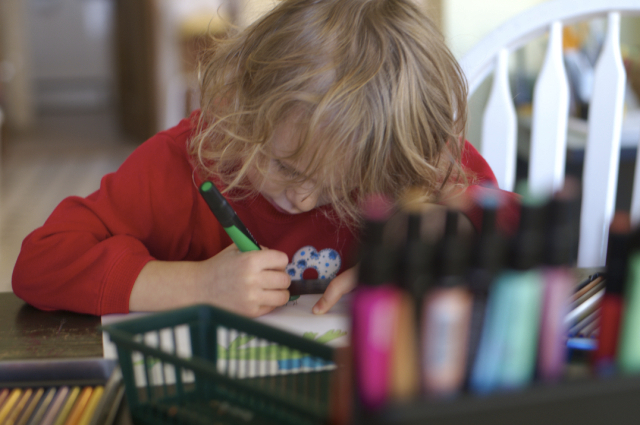
Months ago a reader asked:
I am curious as to what your reading lessons entail for your 6 and 8 yr old. I am (a) homeschooling mom, leaning toward unschooling, but with a partner who truly believes in structure, especially for reading and math. We are looking for suggestions and a middle ground.
This question was in response to a school post I wrote in spring. Kind of bad timing since during spring and summer my mind shifts to outdoors and so it's taken me this long to get around to answering the question. But to my credit I've actually given the subject a lot of thought, especially during this last month. While my brain is in homeschool mode I'm going to write a little series on how we homeschool.
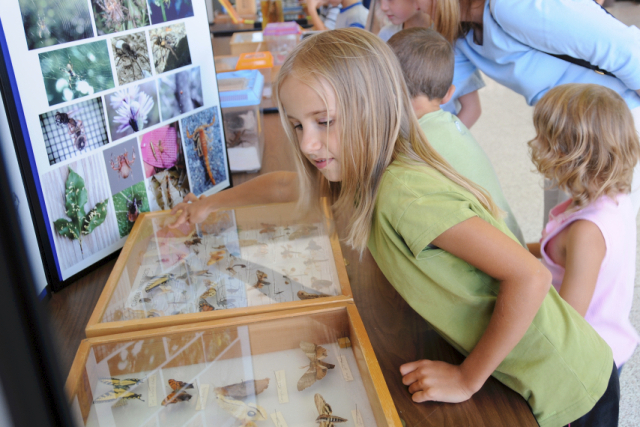
This will be a simple 3 post series. Today I'll explain how we do the early years of elementary, the next will talk about the late elementary years, which we are just starting with Celine. The last will be a schedule of our everyday. (post-script: that last post never did get published but you can check out my thoughts on homeschool/life schedules at Homemaking and Homeschooling.)
Let's start out by defining the Early Years.
I consider ages 6-10 ish to be the early years of elementary. In our family these years are a continuation of the pre-school years with the simple addition of formal lessons as needed. Homeschooling the early years is inexpensive, simple and fun and I've loved watching my children learn, discover and grow during this phase.
Philosophy
Firstly, from comments people make and questions they ask (here and in real life) there is the misconception that we are unschoolers. From a philosophical standpoint we are not unschoolers but some of our practices and our overall attitude looks similar, especially at first glance.
So if we aren't unschoolers, what are we? I'm not sure, but these are our guiding principles for learning and growing during these early school years:
Interest driven learning with an emphasis on character development, unique talents and gifts, creative freedom, family life, household participation, nature exploration and healthy living. And the introduction of math, reading and writing basics.
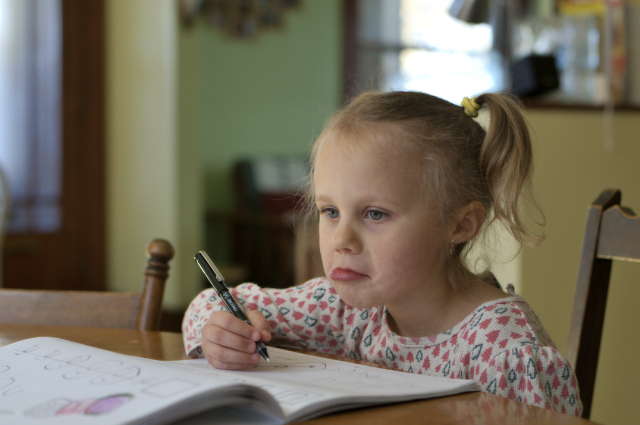
Practice
What this means practically is that we place nominal value (surprise, surprise) on traditional school practices in the early years. Our only "academic" goals are to get the children reading (& to love it) and to introduce basic math and writing skills. In other words reading, writing and 'rithmatic.
All the other traditional elementary school subjects are a part of our everyday life. In fact reading, writing and math are also a part of everyday life but we are intentionally choosing to practice these on a regular basis to give the kids a solid foundation for their later learning.
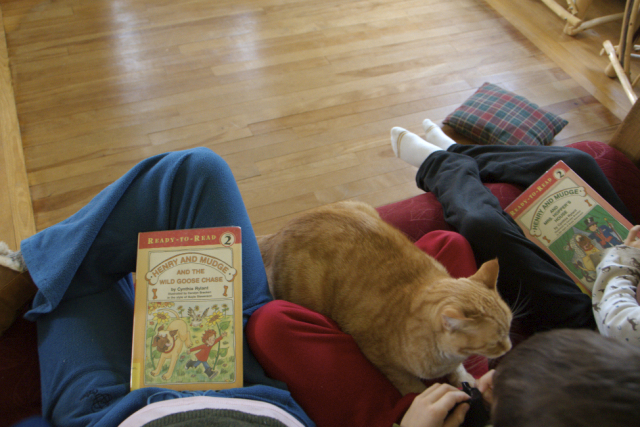
When children are young by simply reading lots of good books, spending time in nature, making crafts, asking and answering questions, participating in home and community life you learn science, history, geography, art, music, physical education and whatever else you want your children to learn.
And of course if your children want to learn more than what your family routine offers you do your best to provide that!
We've tried variations on this theme over the years and most recently (the past 2 years) I've been influenced by Charlotte Mason's ideas. I'll try new ideas each fall but I keep coming back to a basic routine of reading books, being outdoors, participating in our community and creating together at home. And I let the rest flow from there. You can read these posts, doll making and school subjects and spring time learning for snapshots of what this looks like.
There does come a point when you may want to add formal lessons because your kids are ready for more (Or maybe you add them to keep a reluctant partner on board with homeschooling. Just be warned children might not actually learn anything if the subject is introduced before they are ready).
At this stage of "readiness" (individual for each child) is when we add handwriting and reading instruction and then a little later math lessons. And even later, when Celine grew frustrated by her inability to express her thoughts (she was 9 at the time) we added spelling practice.
A good friend who is homeschool grad herself and was my midwife's apprentice at Brienne's birth, wrote a comment on my blog a while back and said this:
I once read a really cool tip for new moms that applies to homeschooling as well. Instead of writing a to-do list, write a list of everything you did as the day goes on. Then at the end of the day, you'll see how much you got accomplished without setting your sights high.
I couldn't agree more, especially during these early years. If you, or a worried partner, are anxious they aren't "learning something" start writing down what they do and say during the day, what you've read and discovered together. Over the course of time you will see they are indeed learning a lot.
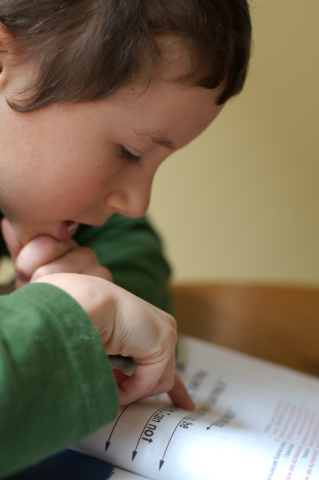
A Recap
In case this post is just too long for you I want to recap the main points of how we homeschool during the early years:
- Continue to do what we were doing with our preschoolers - reading, crafts, nature, family and community life.
- Add reading instruction, handwriting, math and spelling as dictated by family goals and the individual child's needs and readiness.
- Pay more attention to what our children are already learning and doing instead of arbitrarily setting curriculum goals to be met.
For a more in-depth discussion of how homeschooling the early years is natural, affordable and fun I recommend you watch my homeschooling video. More resources for homeschooling can be found at FIMBY Homeschool Help.
Related Posts:
Filed Under
Resource Library
-

Jenn on Oct. 5, 2009, 10:26 p.m.
homeschooling littles is easy...it gets harder! my son is very much into math, science, chemistry, algebra, physics and all that hard stuff that i am dumb in! :( he is almost 14 now...and it's a challenge to keep him challenged.
they need SO much in order to get into college. you are looking at foreign language, advanced math and science courses, etc. it's better to start preparing them more now than to have to really cram tons of learning into a few years later on. it'll just make it harder on them then. so we are doing more advanced things now, even the almost 10 year old is doing the history and science with her 6th and 8th grade siblings!
-

shelli on Oct. 6, 2009, 12:01 a.m.
Renee, I love your post, and I'll probably link to it, if you don't mind. You express yourself very well. This is kind of how I'm picturing our early years in homeschooling too, so it's great to hear your take on it.
I don't know why we even need labels, but I read that "eclectic homeschooling" is kind of a cross between structured and unschooling homeschool. That kind of sounds like what you're doing, and I'll probably use that term for people who ask.
-

shelli on Oct. 6, 2009, 12:04 a.m.
PS Great photos too!
-

Naomi on Oct. 6, 2009, 12:21 a.m.
Awww, thank you Renee! I really appreciate reading your thoughts on life, and you gave me a smile when I read that something I wrote to you a while ago encouraged you. It seems so silly that in this day and age when everyone is pushed to start college funds before your children are born, start planning their education early, and push them to learn everything they need to know as soon as possible, that it is so easy to fall into the trap of feeling like we need to keep up with society's expectations for education. I enjoy watching my children figure things out on their own, and realize that it is just a part of life that our explorative minds keep learning even if they aren't taught x, y, or z. We were just built that way. And I imagine that "official" schooling should be a continuation of that, building on the explorative nature of our minds. It sounds to me like your kids are doing really well with "eclectic homeschooling" (I really like that term by the way), so good job Renee!
-

Candelion on Oct. 6, 2009, 12:41 a.m.
I am in college right now, but I have been considering homeschooling any potential kiddos for awhile. I was not homeschooled, so it is really, really hard for me to envision this kind of home. I was and still am always somewhat envious of any friends who were homeschooled. Their parents had the time and inclination that mine didn't. That's not to say that my parents weren't good life teachers, our relationship was just different. Friends I had in highschool who were homeschooled in elementary years mystified me with a kind of "quality" they had that most traditional students don't possess. I have tried to observe and learn as much as I can, but I can still recognize a difference. So, thank you for helping me form my thoughts on this. I look forward to the next two posts ;)
Oh, quick question I've been meaning to ask: What does your family and you use on your teeth? I have been using baking soda and hydrogen peroxide, but I am always curious about what else people use.
-

renee on Oct. 6, 2009, 1:53 a.m.
That's an interesting question. Currently we use Toms of Maine but I'd like to make our own.
-
-

nicola on Oct. 6, 2009, 3:07 a.m.
i am back. i read the whole post. thank you, again. this is so helpful, even though we have chosen a public charter for now!
oh, and on the toothpaste question, you might try this: http://www.sarahsbluecastle.com/blue_castle/2008/10/toothpaste.html
nicola http://whichname.blogspot.com
nicola's last blog post... putting myself out there - a project for 2010
-

Kika on Oct. 6, 2009, 7:42 a.m.
My kids are spaced out in age: aged four, nine and thirteen and I find that each of their homeschool experiences are ending up different from the others (well, the four year old doesn't yet have a long history to compare). While I prefer to help them acquire solid skills/facility in reading, writing and math, before grade five I believe there is huge benefit in allowing tons of time to create, think, explore, bake, experiment, draw, etc. I want my kids to have the space to figure out who they are, who they want to become, to discover their own passions, strengths and dreams. I am a schedule/ planning maniac so it has been an ongoing battle for me to be willing to cut and slash to make room for personal interests and creative breathing room. It has been a fabulous journey, though. Some days I wonder what on earth it'll look like in two years when my youngest begins grade one, middle child starts grade 7 and oldest begins grade 10 (Elementary, Jr.High and Highschool at the same time)?!
-

kyndale on Oct. 6, 2009, 9:19 a.m.
Renee, this was really helpful to me. Especially today when I felt a little anxious. What I want for my kids is to love to learn and be happy and contribute to the family and our world. Thanks for helping me put this into perspective. It's been hard the last few weeks being sick and getting out of a routine. We love Henry and Mudge, by the way! Also, I started watching your video on homeschooling but I should probably go back to sleep. But, I love everything you say about homeschooling. Great video! It's so fun to see you in real life. I am looking forward to your other posts.
-

exhale. return to center. on Oct. 6, 2009, 8:58 p.m.
thank you so much for this!!!
it is just what i needed to read right now. my husband and i are having many conversations about how homeschooling might look in our family and your approach is right in line with what we have been talking about.
thank you.
~erin
exhale. return to center.'s last blog post... sharing our space
-

renee on Oct. 6, 2009, 10:27 p.m.
Erin, I know you know this but homeschooling is as unique for each family as each family is unique. I've read before on your blog about struggling with the desire for personal freedom and time and I believe that those things can be achieved while homeschooling your children, you just need to be creative in your family's time management.
Wishing your family the best as you figure this out! And you are welcome, I'm so happy it was helpful in some way to you.
-
-

nicola on Oct. 7, 2009, 10:02 p.m.
renee, did you see i nominated you for a blogging award yesterday (10/6/09)? nicola http://whichname.blogspot.com
nicola's last blog post... corner view: local souvenir
-

renee on Oct. 8, 2009, 11:51 a.m.
Yes, I saw it now. Thank you ((blush)).
-
-

Jen on Jan. 20, 2010, 5:07 a.m.
This post really encouraged me! I am setting out into home schooling in the next few weeks. (Weird timing but we live in S. Africa but are in the states for the next 6 months so I'm still following the SA school schedule.) I'm excited but also extremely nervous at the same time. Like you mentioned, I've been worried about teaching my kids what they need to know! They are only 7 and 5. I'm trying to keep an open mind and not set my expectations farther than we can all handle. Thanks for the encouragement!
You can subscribe to comments on this article using this form.
If you have already commented on this article, you do not need to do this, as you were automatically subscribed.
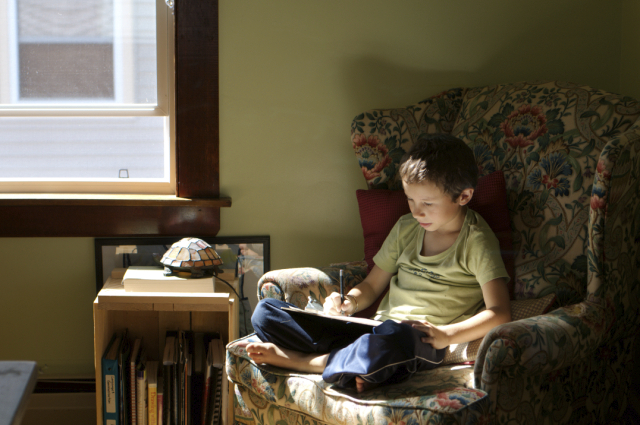






nicola on Oct. 5, 2009, 10:07 p.m.
thank you thank you for this. i am skimming now and have to come back later to read fully, uninterrupted by kids! nicola http://whichname.blogspot.com
nicola's last blog post... putting myself out there - a project for 2010